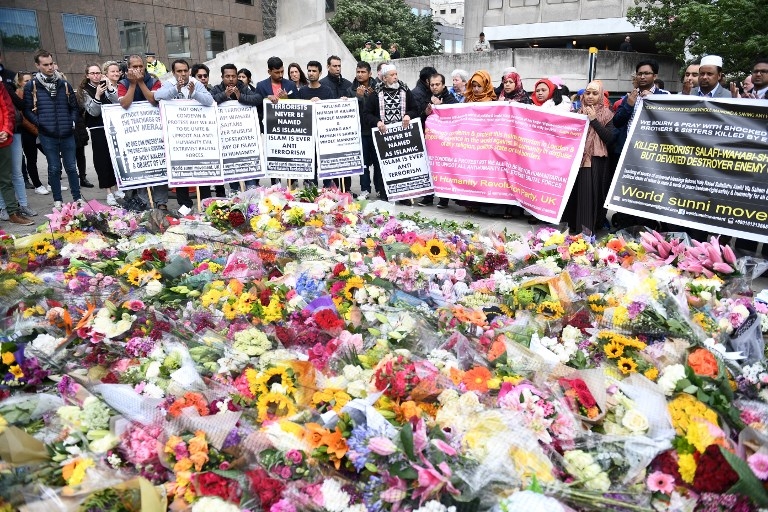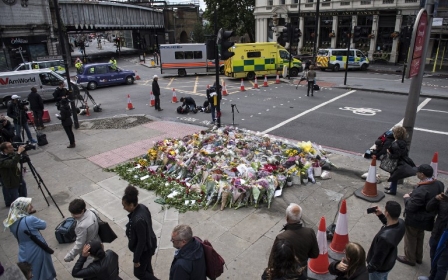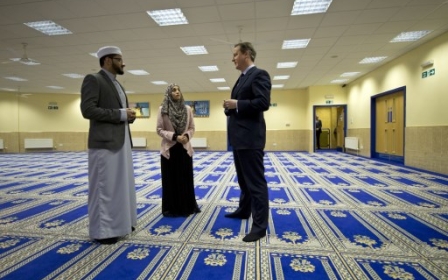London Bridge death toll rises to eight amid election security row

The death toll from the London Bridge attack has risen to eight after police announced on Wednesday that the body of a missing French man has been recovered from the River Thames.
The increased death toll from Saturday’s terrorist attack comes as the UK general election campaign enters its final hours, firmly focusing on security in the wake of militant attacks in Manchester and London.
The eighth victim of the attack, Xavier Thomas, 45, is thought to have been struck by the attackers' van on the bridge and witnesses reported seeing him being thrown into the water.
His body was recovered near Limehouse, downstream of London Bridge, on Tuesday evening by specialist officers from the Metropolitan Police marine unit.
Canadian Christine Archibald, 30, James McMullan, 32, from Hackney, Alexandre Pigeard, 27, and Australian nurse Kirsty Boden, 28, have already been named among the dead.
Meanwhile, three people were arrested on Wednesday in connection with the attack, British police said.
Two men were arrested by police "supported by firearms officers" on a street in Ilford, east London, the Metropolitan Police said in a statement.
The third suspect was apprehended at a home in the same area of the British capital.
Security dominates election campaign
Alongside the tales of human suffering emerging in the wake of the attack, the last days of the general election campaign have focused on a fierce battle over security policy, including accusations from the Conservative Party that Labour leader Jeremy Corbyn had opposed anti-terror legislation throughout his time in Parliament and claims from Labour that Prime Minister Theresa May has failed to stand up to support for extremism from Britain's Gulf allies.
The attack on Corbyn, which has been rejected by Labour as an attempt to distract from a row over Conservative cuts to police numbers, comes after May said on Tuesday that she would be rip up elements of human rights to law to make it easier for authorities to deport or curb the movements of suspected terrorists for whom there is not enough evidence to prosecute in the courts.
On Tuesday evening, May used one of her final speeches of the campaign, which has turned into a debate about national security, to step up her rhetoric against Islamic extremism.
"If our human rights laws stop us from doing it, we will change the laws so we can do it," she said to cheers and applause at a 200-strong election rally.
She also used the speech to call for longer prison sentences for people convicted of terrorist offences, and to make it easier to deport foreign suspected militants.
And in an interview with the Sun newspaper, May said she would consider extending to 28 days the length of time police can hold people they suspect to be terrorists for questioning.
This period was reduced to 14 days in 2011 - in a move criticised by many Labour frontbenchers - when May was serving as home secretary in the coalition government.
Critics of the government say May’s wider anti-terrorism proposals would be in breach of a manifesto commitment that Britain would remain a signatory of the European Convention on Human Rights until 2022.
Extending police questioning time
On Wednesday morning, Labour frontbencher Sir Keir Starmer was caught out when he attempted to defend Labour's record on backing anti-terror legislation, only to be told that Corbyn had missed the key vote.
The shadow Brexit secretary and former director of public prosecutions told ITV1's Good Morning Britain that Labour backed last year's Investigatory Powers Act on powers for the security and intelligence services, with a three-line whip requiring all the party's MPs to support it. However, Corbyn did not vote on the bill’s third reading.
Starmer said: “We [Labour] supported that bill. The Labour Party had a three line whip on it, and I led for that on it and we worked with the Prime Minister."
Labour later said Corbyn had another engagement at the time of the vote and was paired in the normal way.
Conservative Cabinet minister Priti Patel said: "Corbyn has boasted about voting against every piece of anti-terrorist legislation in the past 30 years, he has sided with Britain's enemies and he has shared platforms with speakers who espouse hatred and views that have no place in our society.”
Labour denies it's 'soft on terrorism'
The row over Corbyn's record on terrorism legislation comes as the Labour Party has rejected Conservative claims that its leader addressed a 2002 London rally attended by members of the extremist al-Muhajiroun group, banned by the government in 2010.
The party said Corbyn could not be held responsible for all the views of the thousands of people who attended the event in support of Palestinian rights and that he condemned al-Muhajiroun “in the strongest possible terms”. The rally was reported on by the left-wing Weekly Worker.
“Jeremy addressed a broad-based rally in support of Palestinian rights. It was a public event and he was in no way responsible for the views of the thousands of attendees. Jeremy condemns al-Muhajiroun in the strongest possible terms,” said a party spokesperson.
The Labour leader has repeatedly said he will take all necessary steps to keep Britain safe from terrorism, including supporting the policy of police officers who shoot suspected suicide bombers.
The fierce security debate comes as UK authorities faced new questions over how one of the London Bridge attackers was let into Britain despite being on a security watch list.
Youssef Zaghba had been flagged to British intelligence services after telling Italian police "I'm going to be a terrorist" when he was reportedly stopped from attempting to travel to Syria, authorities have said.
Former Conservative Home Office minister Damian Green said on Wednesday that the European Union information-sharing system should have been enough to stop Zaghba travelling to the UK.
Speaking on BBC Radio 4’s Today programme, Green was asked if the Schengen system should have stopped Zaghba arriving in the UK.
He said: “It should do. I obviously don’t know what happened in this case and speculating without the full facts would be wrong. There’s a police investigation, it’s still going on – we’ve had an arrest in the last 24 hours.”
Police investigating the attack arrested a 30-year-old man on suspicion of terror offences on Wednesday morning. The man who was arrested during a search of a property in Ilford, east London, was taken to a south London police station for questioning, Scotland Yard said.
New MEE newsletter: Jerusalem Dispatch
Sign up to get the latest insights and analysis on Israel-Palestine, alongside Turkey Unpacked and other MEE newsletters
Middle East Eye delivers independent and unrivalled coverage and analysis of the Middle East, North Africa and beyond. To learn more about republishing this content and the associated fees, please fill out this form. More about MEE can be found here.



